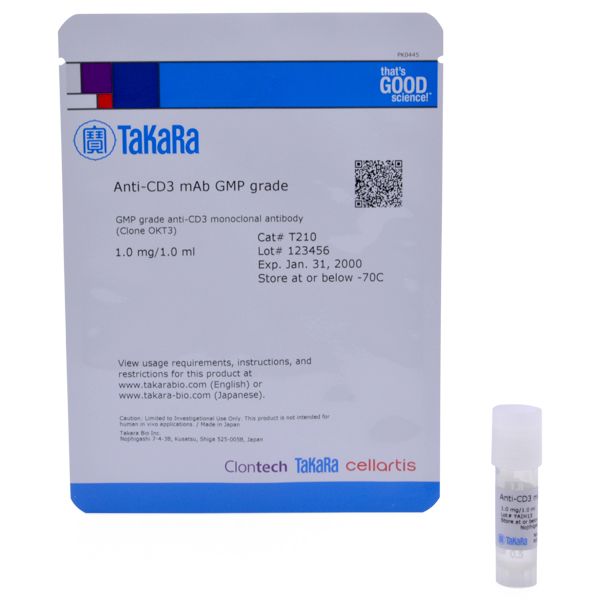Anti-CD3 mAb GMP grade
Anti-CD3 mAb GMP grade
Anti-CD3 monoclonal antibody (OKT3)
T210, Anti-CD3 mAB GMP grade, is manufactured and tested in accordance with the following guidelines, "Standards for Manufacturing Control and Quality Control, etc. of Investigational Products (Investigational products GMP)" notified by the Ministry of Health and Welfare Japan ("PFSB Notification No. 0709002, July 9, 2008)" (PFSB: Pharmaceutical and Food Safety Bureau).
Anti-CD3 antibodies are commonly used in T lymphocyte proliferation protocols. Among many available clones, "OKT3" (mouse IgG2a) is the most commonly used. This monoclonal anti-CD3 antibody (clone OKT3) is manufactured as a quality-assured product, according to relevant guidelines for Good Manufacturing Practice (GMP). This product can be used for ex vivo cell culture processing in preclinical research and investigational phase studies.
Overview
- T210, Anti-CD3 mAb GMP grade (OKT3 antibody), is manufactured and tested in accordance with the following guidelines, "Standards for Manufacturing Control and Quality Control, etc. of Investigational Products (Investigational products GMP)" notified by the Ministry of Health and Welfare Japan ("PFSB Notification No. 0709002, July 9, 2008") (PFSB: Pharmaceutical and Food Safety Bureau)
- GMP-grade anti-CD3 mouse monoclonal antibody, free of animal-derived components
- Clinical-grade anti-CD3 mAb (GMP) can be used for ex vivo cell culture processing (investigational use only)
- Can be used in combination with RetroNectin GMP grade to enhance T-cell (CD8+) expansion efficiency in culture
Applications
- T-cell expansion
Ex vivo T cell expansion from peripheral blood mononuclear cells (PBMC) was performed in the presence of anti-CD3 antibody alone or a combination of anti-CD3 and RetroNectin reagent

Ex vivo T cell expansion from peripheral blood mononuclear cells (PBMC) was performed in the presence of anti-CD3 antibody alone or a combination of anti-CD3 and RetroNectin reagent. After expansion, the percentage of naïve T cells was assessed by expression CD45RA and CCR7.
Product citations
Chen, D. et al. Cytokine-induced killer cells as a feasible adoptive immunotherapy for the treatment of lung cancer. Cell Death Dis. 9, 336 (2018).
Chono, H. et al. Optimization of lentiviral vector transduction into peripheral blood mononuclear cells in combination with the fibronectin fragment CH-296 stimulation. J. Biochem. 149, 285–292 (2011).
Ciceri, F. et al. Infusion of suicide-engineered donor lymphocytes after family haploidentical haemopoietic stem-cell transplantation for leukaemia (the TK007 trial): a non-randomized phase I-II study. Lancet Oncol. 10, 489–500 (2009).
Dodo, K. et al. An efficient large-scale retroviral transduction method involving preloading the vector into a RetroNectin-coated bag with low-temperature shaking. PLoS One 9, e86275 (2014).
Dudley, M. E. et al. Adoptive cell transfer therapy following non-myeloablative but lymphodepleting chemotherapy for the treatment of patients with refractory metastatic melanoma. J. Clin. Oncol. 23, 2346–57 (2005).
Jia, H., Tian, Y., Jiang, C. G. & Han, W. Evaluation of 29 indicators for the prognosis of advanced non-small cell lung cancer with cytokine-induced killer cell therapy combined with chemotherapy. Exp. Ther. Med. 11, 1601–1610 (2016).
Kawamura, A. et al. Six-year disease-free survival of a patient with metastatic eyelid squamous cell carcinoma and colon adenocarcinoma after repeated postoperative adoptive immunotherapy. Jpn. J. Clin. Oncol. 30, 267–271 (2000).
Lamers, C. H. J., Willemsen, R. A., Luider, B. A., Debets, R. & Bolhuis, R. L. H. Protocol for gene transduction and expansion of human T lymphocytes for clinical immunogene therapy of cancer. Cancer Gene Ther. 9, 613–623 (2002).
Li, J. et al. Autologous cytokine-induced killer cell transfusion in combination with gemcitabine plus cisplatin regimen chemotherapy for metastatic nasopharyngeal carcinoma. J. Immunother. 35, 189–195 (2012).
Minagawa, A. et al. Enhancing T cell receptor stability in rejuvenated iPSC-derived T cells improves their use in cancer immunotherapy. Cell Stem Cell 23, 850–858.e4 (2018).


